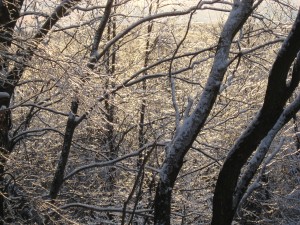Â
Â
In response to a question after one of my recent Cage lectures, I happened to mention Emerson, Thoreau, Ives, and Cage in the same sentence, and then said with a chuckle, “That’s the rectangle I’ve spent my entire life in.†This month it’s come to seem like more than a joke. I’m writing a piece of music about Thoreau, as a companion piece to my On Reading Emerson, for which I read a little of Thoreau’s journal each morning, which has given me quite a few sonic inspirations. For instance:
I am brought into the near neighborhood and am become a silent observer of the moon’s paces to-night, by means of a glass, while the frogs are peeping all around me on the earth, and the sound of the accordion seems to come from some bright saloon yonder. I am sure the moon floats in a human atmosphere. It is but a distant scene of the world’s drama. It is a wide theatre the gods have given us, and our actions must befit it. – June 2, 1841
I am also preparing for a seminar I’m teaching starting next week entirely on the Concord Sonata. We’ll be comparing the 1921 and 1947 editions of the piece with the original manuscript, as well as with other pieces based on the same material: Four Transcriptions from Emerson, The Celestial Railroad, and the Emerson Concerto. I’ve never felt like I fully grasped the “Hawthorne” movement, so one thing I’ve been doing in odd moments is entering it into Sibelius, note by note, both so every note will register with me, and also so I’ll have a MIDI file of it. On top of that I’ve been asked to write a foreword for a 50th-anniversary edition of Cage’s book Silence, which appeared in October 1961. So I’ve reread Silence for about the tenth time, and this time cover-to-cover and more intently than ever, trying to fix once and for all an impression of the book that has rotated wildly over the years.
So I’ve been immersed in these four figures, who for me epitomize what I love about America – and from whom America seems so distant these days, with its tea partiers and Second Amendment obsessions and anti-intellectualism, that I start to think my four heros were all eccentric outsiders, hardly American at all, and the real America is something utterly foreign to me and fairly repugnant. It’s dubious to say that Cage was to Ives what Thoreau was to Emerson, but it certainly seems that Ives was to Emerson what Cage was to Thoreau. Cage didn’t like to talk about Ives, which puzzles me; because Cage’s close friend Lou Harrison did yeoman service as Ives’s copyist-conductor-assistant, and because Ives’s comment on Thoreau seems so perfectly Cagean: “Thoreau was a great musician, not because he played the flute, but because he did not have to go to Boston to hear ‘the symphony.’†(Cage didn’t care for Emerson, either.) I identify more strongly with the Emerson-Ives side of the equation, the Thoreau-Cage side being a little ascetic for my taste. Which is also odd, because I’m also a minimalist, and Thoreau is more minimalist than Emerson.
But Thoreau is easier to marinate oneself in. Since I was in Boston over the weekend, I stopped at Walden Pond (only 16 miles away, Thoreau used to walk it) and tromped around it through the deep snow. I sat on a hillside and even made an ambient recording, my own Walden 4’33†extended to 18 minutes, to bring home and meditate to. That gave me some strong musical images as well, even though the woods were so still that, except for the occasional plane and the lonely train whistle that went by, it was about as quiet as Cage’s anechoic chamber. (Sorry the photo’s not Walden, but I didn’t take my camera.) I rarely teach verbal texts in my classes, but we’ll be reading Emerson and Thoreau (as well as Hawthorne and Bronson Alcott) for my Ives course, so the feeling of getting back to my roots will only intensify in coming months.
Composing has been going slowly because in addition to the Silence foreword I also have the following writing gigs for this month and next:
* finish the Ashley book (done)
* a foreword to a new edition of Perfect Lives
* liner notes for Meredith Monk
* an article on Julius Eastman for a book about him
* a paper on postminimalism for the Ashgate Companion to Minimalist Music, of which I am co-editor, and
* updates for 18 Grove Dictionary bios, of which I’ve completed five.
I’m determined to spend my summer composing, so I hope American music can get by without me for three months.


